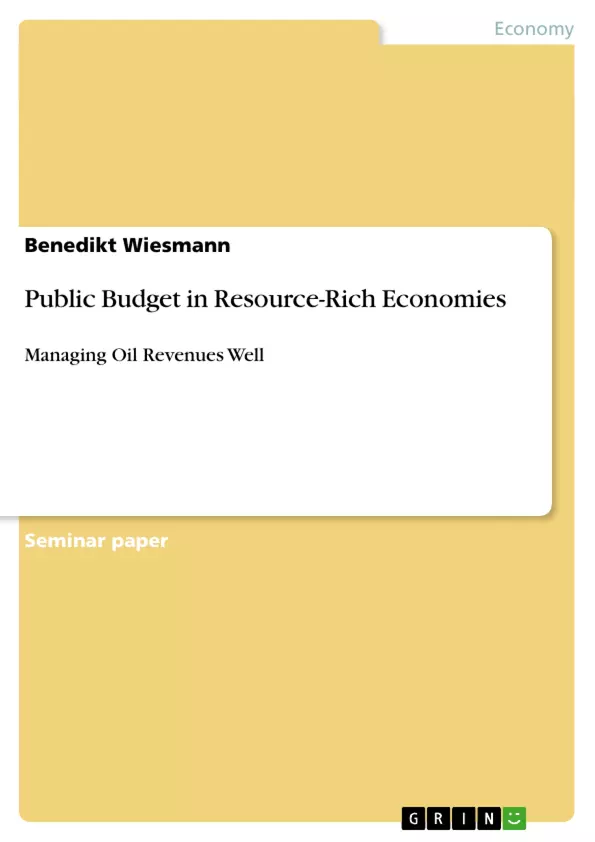The objective of this paper is to examine how public expenditures, revenue and debt in resource-rich economies changed in the past, how politicians and bureaucrats respond(ed) to resource abundance, and how an optimal budget rule for resource-rich economies should be designed. The paper follows a non-technical approach and comes to the conclusion that the successful management of resource revenues highly depends on the political situation in an economy as this determines how well it sticks to any budget rule. The budget rule presented in section IV approaches the different parameters which are at play and shows challenges regarding the rule’s practical feasibility.
Inhaltsverzeichnis (Table of Contents)
- Introduction
- What can be learnt from history
- The Dutch disease hypothesis
- Reduced incentives to develop the non-resource part of the economy
- High volatility of resource revenues
- Political economy effects of resource abundance
- Designing an optimal budget rule
- Conclusion
Zielsetzung und Themenschwerpunkte (Objectives and Key Themes)
This paper aims to analyze how public expenditures, revenue, and debt have changed in resource-rich economies, exploring the impact of resource abundance on political and bureaucratic responses. It also seeks to outline the design of an optimal budget rule for these economies.- The Resource Curse: Examining the negative effects of resource abundance on economic growth, including the Dutch Disease hypothesis and the impact of political instability.
- Fiscal Policies: Analyzing how resource-rich economies manage public expenditures, revenue, and debt, particularly during periods of resource boom and decline.
- The Role of Institutions: Investigating the influence of institutional quality, governance, and democracy on the management of resource revenues and long-term economic success.
- Designing an Optimal Budget Rule: Proposing a framework for resource-rich economies to manage resource revenues effectively and sustainably.
- Political Economy: Exploring the impact of political systems and governance on resource management, emphasizing the relationship between resource abundance, conflict, corruption, and institutional quality.
Zusammenfassung der Kapitel (Chapter Summaries)
Introduction
This section introduces the topic of resource-rich economies and challenges the assumption that resource abundance automatically leads to economic prosperity. It highlights the "resource curse" phenomenon, illustrated by the example of Nigeria, where despite significant oil exports, the population remains among the poorest in the world. The paper outlines its objectives, exploring changes in public expenditures, revenue, and debt, as well as the political and bureaucratic responses to resource abundance. It also addresses the need for an optimal budget rule for resource-rich economies.What can be learnt from history
This section delves into historical developments in resource-rich economies, contrasting those that have flourished with those that have experienced the "resource curse," characterized by boom-bust cycles and economic decline. It examines the "resource curse" theory, highlighting its main explanations: the Dutch Disease hypothesis, reduced incentives to develop non-resource sectors, the volatility of resource revenues, and the negative impact of resource abundance on political economy.Designing an optimal budget rule
This section focuses on the design of a budget rule specifically tailored to resource-rich economies. It aims to integrate findings from the previous sections, particularly those related to the resource curse and the behavior of institutions. This section is expected to offer concrete strategies for managing resource revenues effectively.Schlüsselwörter (Keywords)
This paper focuses on key areas in the study of resource-rich economies, including public finance, economic growth, the resource curse, fiscal policy, Dutch disease, institutional quality, political economy, and the design of optimal budget rules.Frequently Asked Questions
What is the "Resource Curse"?
The resource curse refers to the paradox that countries with an abundance of natural resources often experience slower economic growth and worse development outcomes.
How does the "Dutch Disease" affect an economy?
Dutch Disease occurs when a resource boom leads to a currency appreciation, making other sectors like manufacturing less competitive on the global market.
Why are resource revenues so volatile?
Revenues depend heavily on international commodity prices, which fluctuate based on global supply, demand, and geopolitical events.
What is an optimal budget rule for resource-rich countries?
An optimal rule aims to decouple public spending from current resource revenues to ensure long-term fiscal stability and prevent boom-bust cycles.
How do political institutions influence resource management?
The success of managing resource wealth depends on the quality of governance; strong institutions help prevent corruption and ensure revenues are invested for future generations.
- Arbeit zitieren
- Benedikt Wiesmann (Autor:in), 2012, Public Budget in Resource-Rich Economies, München, GRIN Verlag, https://www.grin.com/document/211907



